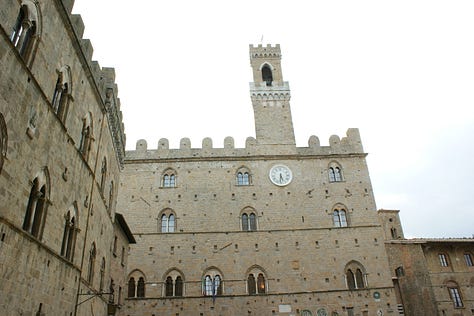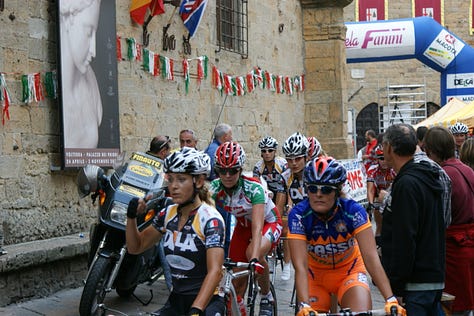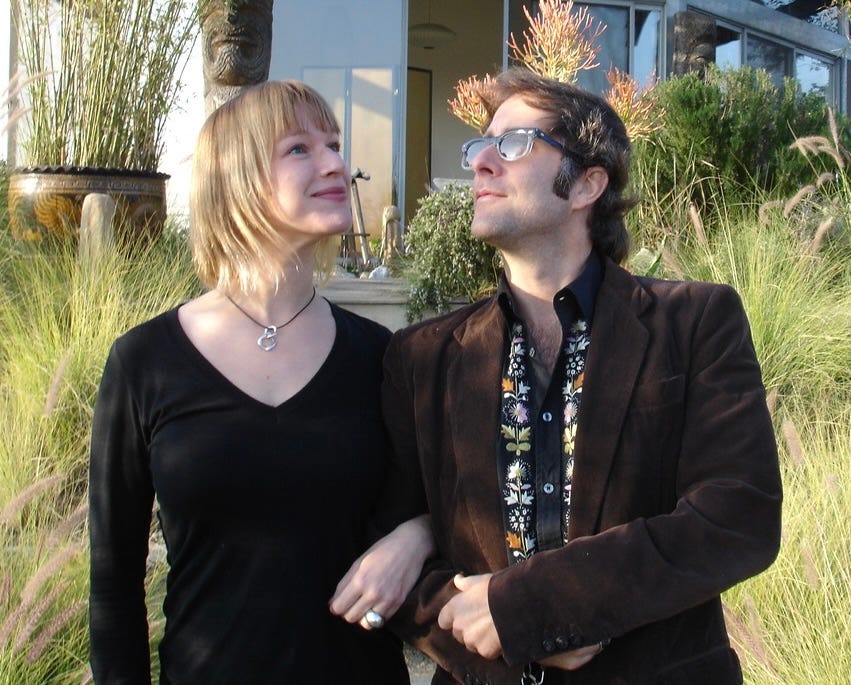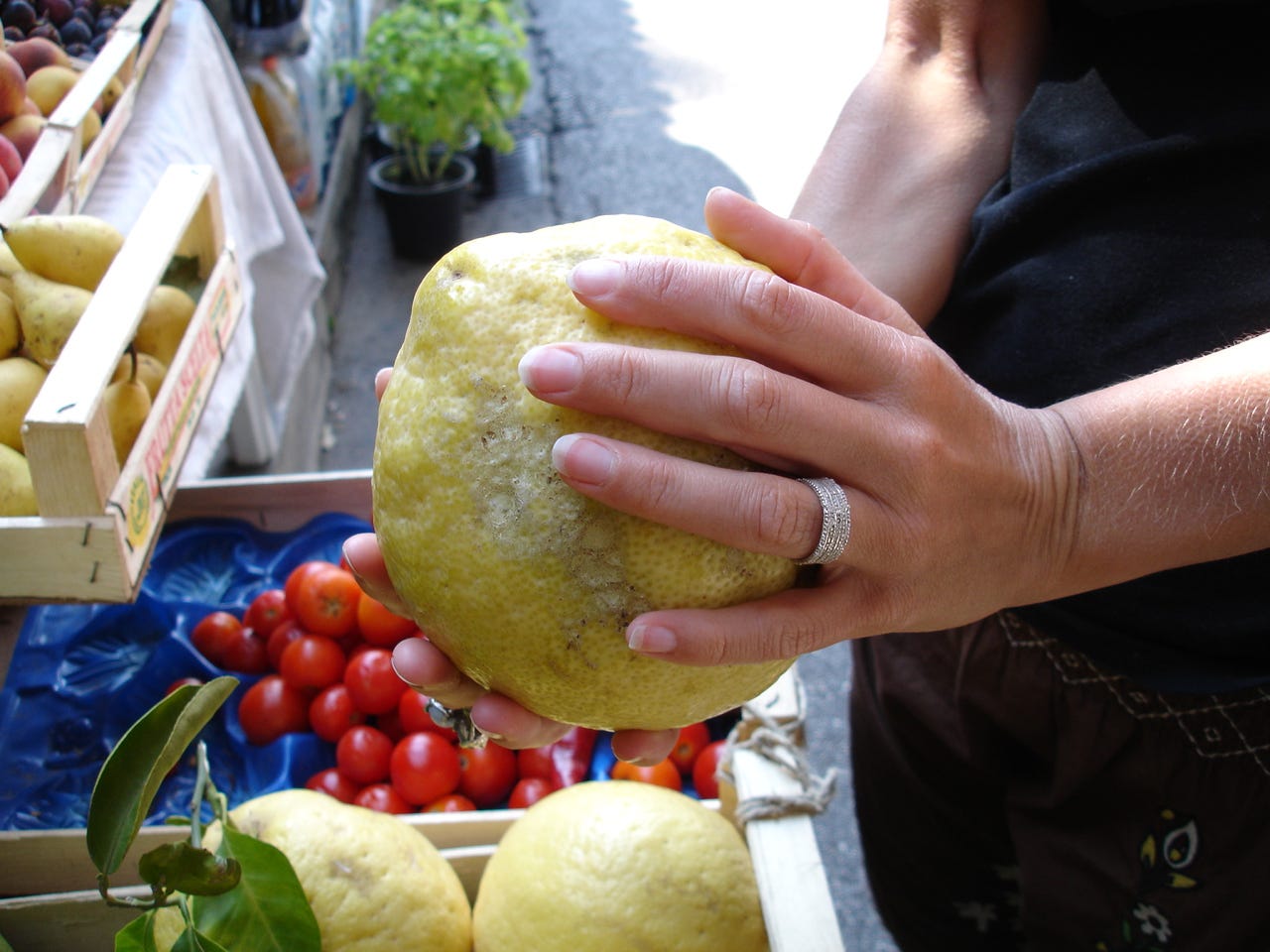⌂ Italy Stands for Love: Marriage in 7 Acts
On fireworks, murder investigations, and bicycle races.
1. Denial
For the longest time, I didn’t believe in marriage. My parents divorced when I was nine, and I never dreamt of becoming someone’s wife. What was the point? You cannot assure yourself against loneliness, and giving up my independence felt like supporting systems I didn’t fully endorse.
Matrimony was a product of patriarchy, christianity, and capitalism.
When I told Daniel in my early twenties I wasn’t the marrying type, he seemed relieved. We moved in together soon after we met not only because we were madly in love, but because it was practical: I couldn’t afford to live in Paris on my own. I disliked sacrificing my self-reliance—I had a terrible experience living with a man in the Netherlands—but I could either share a crappy place with other students or live in a charming atelier with the man I loved.
2. Pre-Proposal
I changed my mind on a dark, dreary day in January 2007, seven years after we met.
Daniel lay ill in bed, suffering from a nasty flu and a spastic colon. I encouraged him to sip water, regularly took his temperature, and lay beside him, reading.
When his cramps got really bad, he looked at me in alarm and said he was dying. This didn’t scare me. We’d recently visited a specialist in the American hospital in Paris about his problems and I’d been reassured the spasms were due to lactose and/or stress. Besides, I’d seen my father die, and Daniel didn’t look like a man who was about to expire.
Still, his fear brought the idea of death into the room. I breathed it in like toxic smoke and imagined him gone. I choked with grief—the pain was lacerating. I suddenly longed for something that would tie us together, a lasting commitment, a bond that existed beyond us and would therefore survive his death, a special pact that might comfort me in the end when the inevitable would happen.
Death, after all, is inescapable and the more we love, the more we stand to lose.
As I lay beside him, holding him, caressing his sweat-wet hair, I whispered into his ear: “I changed my mind about marriage. I want to tell the world you’re the one for me. You don’t have to say anything now. But if you’d like to be married to me, you may want to propose. In the next twelve months or so. If you don’t, that’s totally fine, too, and we’ll just keep loving each other as we’re doing now.”
He moaned.
What did it say about us, I later wondered, that I pre-proposed to him when he was at his weakest?
“Please squeeze my hand if you’ve understood what I said about marriage,” I added.
He squeezed my hand.
3. Proposal
For a year, I truly didn’t know whether Daniel would propose to me. He needed time to consider my idea, I think, and might have felt uncomfortable discussing it with me. Daniel is someone who acts on feelings rather than put them into words.
I enjoyed the not-knowing, the delightful tension, probably because our relationship felt safe, no matter what his decision turned out to be.
My doubts about our future concerned the shape our relationship might take. Would he become more controlling once we were legally bound? Less accommodating? Could I marry him without becoming a subjugated wife?
In December 2007, two dear friends invited us (along with a bunch of LA music people) to come to Iceland. We snowmobiled on a glacier, stood in awe of waterfalls, and said “no thank you” to fermented shark meat.
Our New Year’s Eve celebration was lively and chaotic. We had dinner with many others in a house, then went to another building in multiple cars after midnight to better see the fireworks. It’s legal in Iceland for citizens to celebrate the New Year with roman candles, comets, rockets, and more, and they do so generously. I raced up the stairs and from the roof, admired the sky filled with lights.
Daniel, meanwhile, was trying to find me. Nervous, he’d postponed popping the question until now. When he finally tracked me down, he guided me into an apartment, then out onto a balcony. I had a clear sense of what was coming.
Nearly a year after my pre-proposal, yet mere minutes into the new year, he said: “Do you still want to marry me?”
“Yes,” I said. “But what you just asked wasn’t a proposal.”
Did he go on one knee? Or is that how I like to remember it? I’m fairly sure, he said: “Will you be my wife?”
4. Pre-Honeymoons (or how I had to swear I wasn’t a murderer)
We wanted an intimate wedding that would last multiple days. We wanted it to feel like a group of friends on a weekend trip. We wanted to be outside “my” Netherlands and “his” USA. Perhaps we’d tie the knot in France, where we lived? But that was bureaucratically far more complex than Italy, where we’d spent our first summer, fell deeper in love, and envisioned our future together.
In our marriage year, we traveled to Italy twice before our wedding. The first time we scouted venues—how much beauty could we afford? The second time we met with our wedding planner, who doubled as our official interpreter and proved essential in obtaining our paperwork.
The most memorable moment happened in the Palazzo Vecchio in Florence. Gorgeous as the building is from the outside, the inside looked like a grey cubicle maze from a Kafka novel. At a magistrate’s desk in a faraway corner, in an archaic ceremony necessary to obtain a nulla osta, I swore under oath that I had not murdered Daniel’s previous spouse (who didn’t exist) and was never investigated by the police for this crime.
5. Wedding
On September 18, 2008, Daniel and I celebrated our love on a rolling vineyard in Tuscany. Our 25 international guests stayed in small houses scattered over the landscape. On our wedding day, a yoga teacher brought half of us together on the mat to greet the sun.
At noon, I put on my non-white designer dress and met my family and friends for a copious lunch. We headed to Volterra next where the feminine Giro d'Italia was just finishing—a shocking surprise. Bicycles raced into the ancient town as names and scores were announced through loudspeakers attached to Italy’s oldest city hall, where we were supposed to say our vows.



The mayor kindly postponed our wedding for an hour, which gave Daniel and me extra time to pick up our last-minute wedding rings that looked like Etruscan antiques.
We said Yes, Ja, and Si, gathered kisses and applause, and toasted with Prosecco.
Back at the vineyard, a local chef served us an organic wedding meal presented on fig leaves—for luck. We dined al fresco, drank a lot of Chianti, danced a little, and later, when the party was over and we were all in bed, listened to the rain coming down as in a deluge.
6. Honeymoon
Two days after our wedding, we traded Tuscany for the Amalfi coast. We started in Napoli, explored Pompei, ate our way through Positano, gazed at the sea from splendid Ravello, and finished our honeymoon at the island of Capri, where the water was dark blue, cold, and supposedly full of sharks—we swam anyway.
[Side note: I would recommend this itinerary to everyone, married or not, but I’ve read that the Amalfi coast is over-touristed now during peak season, so you’ll probably find more summer bliss in other gorgeous areas such as Puglia, the heel of Italy’s boot.]
7. Marriage
Daniel and I have been a couple for 24 years, which is half of my life. We’ve been married for 16 years, which is two thirds of our total time together.
Did something change between us after we got married? Not much, I admit, but I believe we both felt more sure that we would last. We’d said our vows in front of our loved ones, so now we magically benefited from their protection. We were more responsible to make our relationship work. Failing to stay together, would be like failing them.
“It made us more real,” Daniel replied when I asked him last night what he thought had changed.
Marriage is work, the cliché goes, and what kind of work depends on the couple. How Daniel and I learned to accept our differences and grow toward each other is a subject I’d love to explore in a future essay. I’ll end today by saying that we devoted as much time to understanding ourselves, our unconscious beliefs and shortcomings, as to reading each other, and that being in balance together is never a fixed state.
Desk Journey aka Book Recommendation
I recently devoured Liars by Sarah Manguso. This exquisitely written novel about a failed marriage is a painful read. The author dissects everyday moments that appear minor when seen alone yet up to emotional abuse.
As soon as I started talking about the book, Daniel downloaded a library copy and began to read it as well. This may be one of the reasons our marriage is healthy: We want to share in what fascinates the other. When I later asked him what he thought of Liars, he seemed embarrassed and told me he’d recognized some similarities between the fictional husband’s shenanigans and his own behavior in the past. He also expressed the hope that the awful fictional husband made him look good by comparison. (It did.)
I’ll now amend my previous statement about the book: Liars is not a novel about a failed marriage. It’s a novel about how the patriarchy teaches men to act and women to endure, and how this impacts all couples, healthy or doomed.
“It was my responsibility never to say anything that might make him feel as if he'd ever done anything wrong. Feeling that he'd done something wrong really threatened his sense of entitlement.” From Liars by Sarah Manguso.
Time to Say Goodbye
I know, I know, last week I promised you another essay about Amsterdam, and now I’ve served you this semi-sappy thing about marriage.
But at the time I totally forgot that September 18th is my wedding anniversary, and it felt wrong not to acknowledge that day at all. Also: Daniel and I just returned to Italy, where important moments of our love story took place. So I changed the schedule to keep this newsletter as authentic as possible. What was true at the start still stands: Expect the unexpected.
My essay on Amsterdam, tolerance, drugs, and right-wing politics is now slotted for next week. After that, I’ll probably take you to Italy, where I plan to stay for the next three months. Then again, who knows what will happen?
With love from a place of love,
Claire
P.S. Please share your (anti)marriage stories below! My essay on my 107-year-old grandmother was an unexpected success and inspired many people to write their own tributes to their omas and abuelas. They were such a joy to read.
P.P.S. By liking, sharing, recommending, or commenting, you will draw more readers to my work. And more readers means more writing opportunities. This is how authors grow. Thank you in advance!










Thank you for your story, from anti-marriage to marriage. In my case, I met my wife Susan in college and for the first time I felt a strong connection to someone.
But my parents having divorced when I was very young, I was afraid of marriage. So we sort of agreed not to marry, at least putting off the idea while I went far away to graduate school for a year. But that was too much for us and we married the next year—beginning a 58 year journey together.
It’s been a wonderful life together and I sometimes think how my life would have turned out had I not stepped into the same elevator where Susan was standing one long time ago in September … unaware of course that my world was about to change.
This is a joy to read. I enjoyed every word of it - especially the part where you had to swear that you did not murder Daniel’s non-existent ex-wife. (I would love to know the origin of that requirement; there is, no doubt, a good story behind that.)
I was so moved by the image of you lying next to Daniel, febrile and with stomach cramps, deciding that you wanted to marry him. Facing mortality so often makes believers of us.
Thank you for sharing this with us, dear Claire. I wish you and Daniel many, many more years of love and adventure.
In celebration of your years together, here is a little poem by the late W.S. Merwin:
ANNIVERSARY ON THE ISLAND
The long waves glide in through the afternoon
while we watch from the island
from the cool shadow under the trees where the long ridge
a fold in the skirt of the mountain
runs down to the end of the headland
day after day we wake to the island
the light rises through the drops on the leaves
and we remember like birds where we are
night after night we touch the dark island
that once we set out for
and lie still at last with the island in our arms
hearing the leaves and the breathing shore
there are no years any more
only the one mountain
and on all sides the sea that brought us